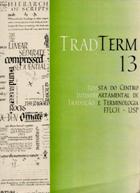End-user perception of screen translation: the case of Italian dubbing
DOI:
https://doi.org/10.11606/issn.2317-9511.tradterm.2007.47468Keywords:
Audience perception, end-users, empirical research, audiovisual translation, television dubbing.Abstract
Despite the lack of attention that has been so far devoted by the academic world to audience perception and enjoyment of Audiovisual Translation, it is clear that several lingua-cultural elements of dubbed texts might be problematic for foreign viewers and, as such, deserve further consideration. For example, what do viewers make of the numerous culture-specific references in dubbed texts? Are they disturbed by the unnatural sounding Italian expressions which are obviously calques from other languages? And if not, why do they tolerate them? This essay sets out to fill a gap in the field of research in Screen Translation by providing data on end user perception of dubbed programmes on Italian tv. In order to shed light on some of these issues, an experimental study was set up. A corpus of clips from American tv series dubbed into Italian was collected and shown to samples of viewers made up of cinema and tv experts, linguists, practitioners working in the field of dubbing, as well as lay members of the general public. Each of the clips contained an example of the problematic elements described above, with particular focus on highly culture-specific references and examples of dubbese. After watching the clips, respondents were asked to fill out a questionnaire which set out to measure their understanding and enjoyment of each excerpt. Results displayed widespread poor comprehension of culture-specific references and a varied degree of tolerance to dubbese.Downloads
Download data is not yet available.
Downloads
Published
2007-12-18
Issue
Section
Tradução Interlingual - Dublagem
License
Autores que publicam nesta revista concordam com os seguintes termos:
- Autores mantém os direitos autorais e concedem à revista o direito de primeira publicação, com o trabalho simultaneamente licenciado sob a Licença Creative Commons Attribution BY-NC-SA que permite o compartilhamento do trabalho com reconhecimento da autoria e publicação inicial nesta revista.
- Autores têm autorização para assumir contratos adicionais separadamente, para distribuição não-exclusiva da versão do trabalho publicada nesta revista (ex.: publicar em repositório institucional ou como capítulo de livro), com reconhecimento de autoria e publicação inicial nesta revista.
- Autores têm permissão e são estimulados a publicar e distribuir seu trabalho online (ex.: em repositórios institucionais ou na sua página pessoal) a qualquer ponto antes ou durante o processo editorial, já que isso pode gerar alterações produtivas, bem como aumentar o impacto e a citação do trabalho publicado (Veja O Efeito do Acesso Livre).
How to Cite
Bucaria, C., & Chiaro, D. (2007). End-user perception of screen translation: the case of Italian dubbing. TradTerm, 13, 91-118. https://doi.org/10.11606/issn.2317-9511.tradterm.2007.47468








